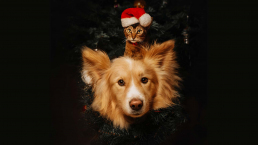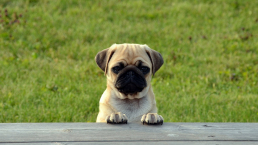KENNEL COUGH
There have recently been several reports of kennel cough in and around the area. Not all reports have been via kennels where dogs have boarded, and therefore the virus is being contracted in areas where dogs are being walked and socialised.
Contrary to belief and because of its name, Kennel Cough does not originate from kennels. It is in fact brought in by an unsuspecting owner with a dog showing no symptoms on the day a dog is checked in for boarding. There is no additional risk of contracting the virus from dogs staying in kennels than dogs interacting in a park.
Kennel cough has an incubation period of 2 to 14 days before the cough develops in most dogs. This makes it very difficult for us to trace when the virus may have been brought into kennels. Like any human cough and cold it can circulate very quickly and like a human cold it is not always the case that your dog will contract the virus having been in contact with other infected pets.
We do not require the kennel cough vaccine at Crossways due to the fact it does not cover all strains of the virus. Also due to the nature of the vaccine it is not always suitable for pets with certain medical conditions to receive. In addition to this, owners who suffer from compromised immune systems (i.e, receiving chemotherapy) are also not able to have their pets vaccinated.
Please see below some facts about Kennel cough from the Blue Cross to help if your pet contracts the virus for your information, however we do need to point out that we provide this information as a guide for owners. As kennels are not medically qualified to advise on the condition, it is the responsibility of a pet owner to contact their registered veterinary practice to discuss concerns and advise how to treat accordingly.
What is kennel cough?
Kennel cough is the common name given to infectious bronchitis in dogs. Just as in chest infections in humans, a number of different bacteria and viruses can cause the illness – normally a combination of both. It affects their respiratory system, causing them to cough.
What does the cough sound like?
The most obvious symptom of kennel cough is a forceful, hacking cough, which will often sound like your dog has something stuck in their throat. The cough can be dry and hoarse or productive, in which case it can be followed by a gag, swallowing motion or the production of mucus. It is distinct from a cough-like sound known as reverse sneezing, which is common in certain breeds and is triggered by irritation in the throat. This sound can often be mistaken for a cough, choking fit, sneezing, retching, or gasping for breath.
In most cases, dogs with kennel cough will appear healthy apart from coughing. But some dogs will have a runny nose, sneezing or eye discharge. They should retain their appetite.
Is Kennel cough dangerous or life threatening?
While a nuisance, kennel cough is not normally dangerous and is likely to need no treatment at all. But in puppies, elderly dogs or those with existing illnesses, the condition can be more serious and can develop into pneumonia. Depending on the germs which have caused the virus, some strains of the infection can also be more severe than others.
How can dogs catch kennel cough?
Kennel cough is airborne, which is why it can spread through kennels quickly.
A dog’s respiratory system is designed to protect against the invasion of infection, but certain situations and environments leave them more vulnerable to illness, however the virus can also be picked up on daily walks. Kennel cough has an incubation period of two to 14 days, and some dogs can be carriers of the infection for months without developing symptoms.
Is there a treatment for kennel cough?
In most cases, dogs will recover from kennel cough without treatment within three weeks, but it can sometimes linger for anything up to six weeks. To aid recovery, make sure your home is well ventilated and avoid using a collar and lead, as any pulling might aggravate the windpipe further – a harness is a better option on walks. If you feel your dog needs more help with recovery, then please seek veterinary advice. Should treatment be given, antibiotics can kill the Bordetella bacteria. Cough suppressants and anti-inflammatories can also be given to make your pet a bit more comfortable as they make a natural recovery but please ask your vets for advice.
Here at Crossways, we use a special disinfectant which is safe but effective. It destroys viruses, bacterial fungi and ringworm. All kennels are cleaned inside and outside every morning along with cleaning checks throughout the day. We have a rigorous cleaning routine before a dog arrives and when a dog leaves. This includes scrubbing walls, the runs and all the plastic beds in addition to the hot washing of bedding and bowls being thoroughly cleaned.
As the kennel cough bacteria is airborne and invisible to the eye, we at Crossways can only do our very best at keeping the virus at bay. Your pet’s health is paramount to us, and we go above and beyond to make sure they are all healthy and safe.
We love looking after each and every one of your pets and look forward to seeing them all to stay
Thank you for your understanding and please feel free to contact us should you have any queries.
Emma and all the team at Crossways


